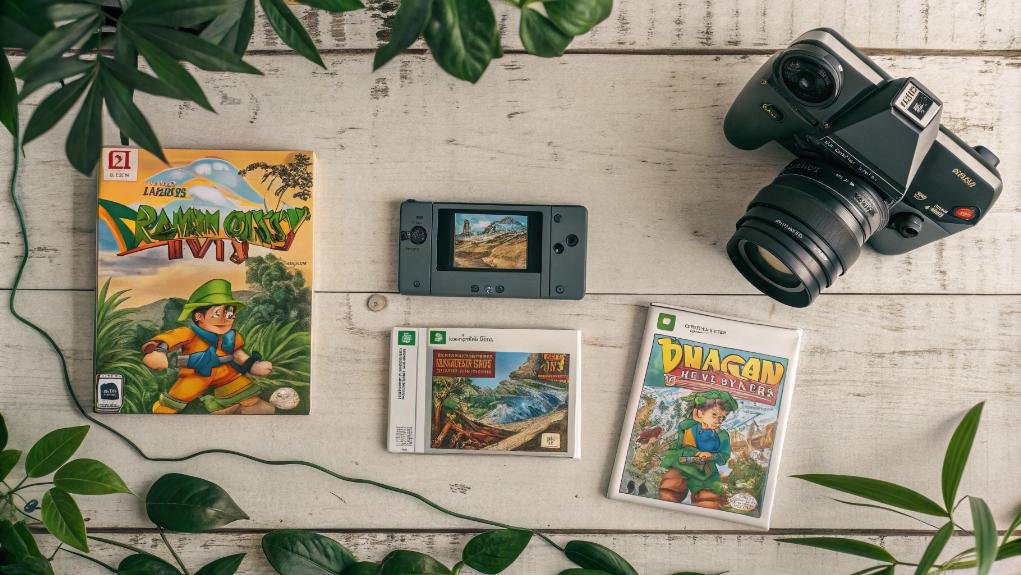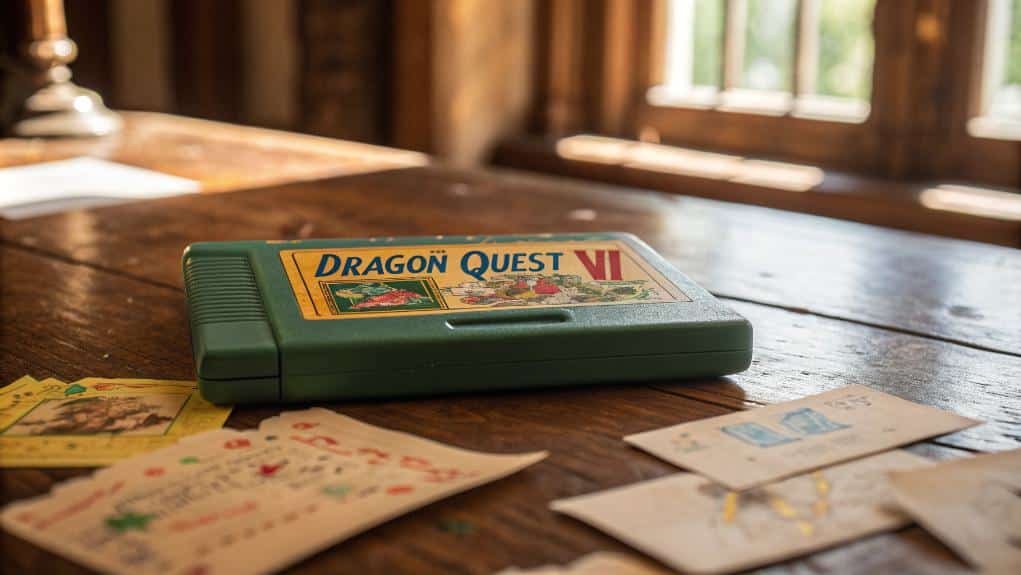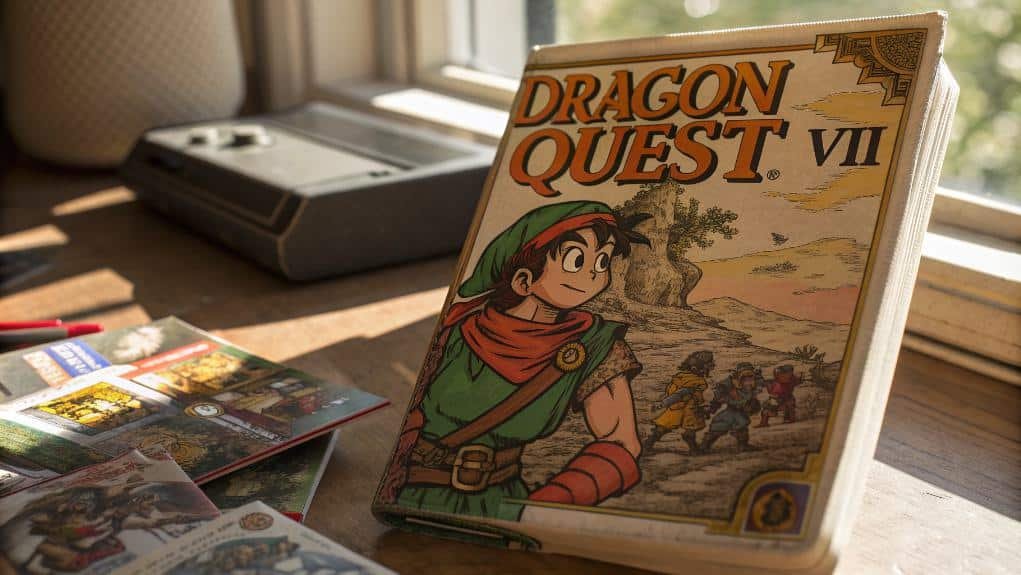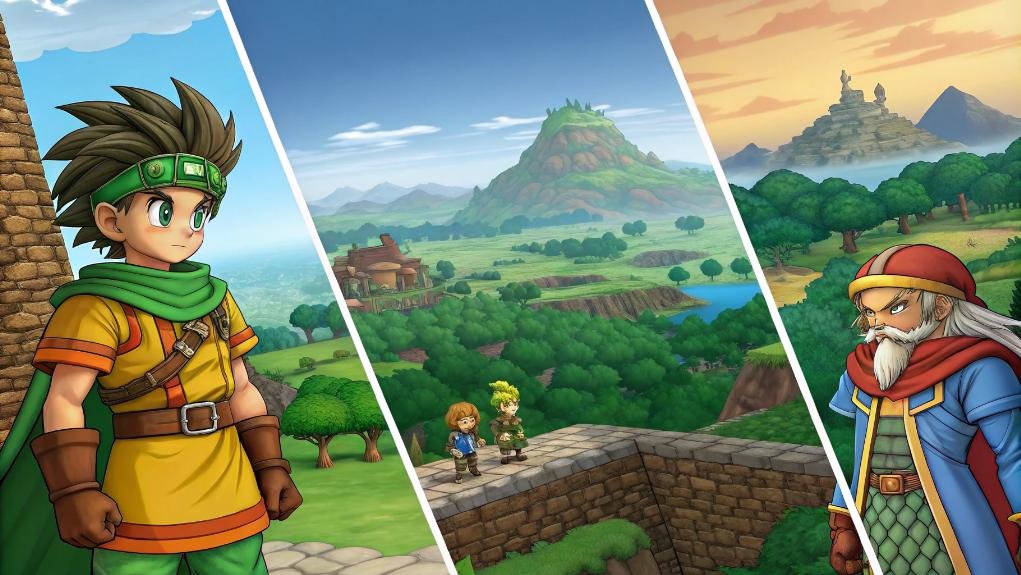Dragon Quest VII emerges as a pivotal title in RPG history, recognized for its intricate narrative and innovative gameplay. Initially developed for the Nintendo 64DD in 1996, it shifted to PlayStation, launching in Japan in 2000 and in the U.S. as Dragon Warrior VII in 2001. The game's localization faced significant challenges, including cultural sensitivities and dialect issues, which altered players' experiences. A 3DS remake introduced numerous gameplay improvements, enhancing character customization and storytelling. This iconic entry not only reshaped the RPG landscape but also set impressive sales records, signaling its lasting impact on the genre. There's much more to uncover about its legacy.
Key Takeaways
- Dragon Quest VII was initially announced in 1996 for Nintendo 64DD before shifting to PlayStation and releasing in Japan in 2000.
- The game faced localization challenges, including translation accuracy, cultural sensitivity, and backlash over character name changes and dialect issues.
- The 3DS remake introduced gameplay innovations, such as visible enemy encounters, a deep class system, and time travel mechanics to enhance the experience.
- Dragon Quest VII achieved significant commercial success, selling 3.57 million units in 17 days, becoming the best-selling PlayStation game in Japan.
- The game's legacy includes a blend of Japanese folklore and mythology, influencing the RPG genre and cultivating a dedicated fanbase over the years.
Development and Release Timeline

The development and release timeline of Dragon Quest VII illustrates a complex journey marked by significant changes and challenges. Initially announced in 1996 for the Nintendo 64DD, the project faced considerable development challenges when the team decided to shift to the PlayStation in early 1997. This platform change stemmed from a desire to tap into a larger market and benefit from lower manufacturing costs.
With a dedicated team of around 35 members, the project experienced multiple delays as developers aimed to meet the high expectations of fans. Despite their initial reluctance, the inclusion of CG movies and cinematics became a point of contention, as the developers sought to preserve the series' essence while innovating. Notably, the game would later include a class system that allowed for extensive character development, enhancing gameplay depth and player engagement.
Ultimately, the game launched in Japan on August 26, 2000, and reached the US one year later under the title Dragon Warrior VII. Subsequent re-releases, including the PSOne Books edition and the 3DS remake, showcased the enduring legacy of Dragon Quest VII, as well as its evolution through the years. Each stage of its development and release reflected the ongoing commitment to quality and fidelity to fan expectations.
Gameplay Innovations
Gameplay innovations in Dragon Quest VII have greatly transformed the player experience, enhancing both accessibility and engagement. The remastered version for 3DS introduces streamlined gameplay, eliminating the slow start common in earlier RPGs. By reducing puzzle-solving and incorporating a guidance mechanic for fragment collection, players can plunge into the adventure without unnecessary delays.
The switch from random encounters to visible ones notably enhances the exploration experience, allowing players to strategize their approach to combat. Combat mechanics have also seen improvements, with a deep class system that enables characters to access and master various abilities. Skills learned remain available even after class changes, promoting a dynamic combat strategy. The revamped introduction for a more engaging start ensures that players are quickly immersed in the central plot of restoring lost memories.
Exploration enhancements, such as fast travel options—including sailing and using the skystone—facilitate a more fluid journey across diverse terrains. Players can easily navigate between different continents in the past, making the vast world feel more reachable.
Additionally, the ability to interact with party members outside of battles offers richer storytelling and character development. These innovations collectively guarantee that Dragon Quest VII stands out as a more engaging and user-friendly RPG, appealing to both new and returning players.
Localization Challenges

Localization challenges in Dragon Quest VII reflect the complexities of adapting a culturally rich RPG for diverse audiences. The localization team faced hurdles in maintaining translation accuracy while considering cultural sensitivity and fan expectations. Dialect challenges arose as extreme accents and character name changes sparked outrage among long-time fans, who valued character consistency and script fidelity. Additionally, the early localizations of the series were generally accepted by fans, creating high expectations for future translations.
| Localization Issue | Description |
|---|---|
| Accent Choices | Exaggerated accents in DQIV caused controversy. |
| Name Changes | Characters like "Hassan" became "Carver." |
| Script Changes | Significant alterations affected readability. |
| Cultural Considerations | Symbols like crosses were replaced for sensitivity. |
| Consistency Issues | Ensuring uniformity across languages was tough. |
Despite these challenges, the small localization teams aimed for professionalism, creating glossaries and conducting thorough QA to enhance the game's storytelling. They sought to preserve the original essence while making creative choices, such as accent usage. The balance between script fidelity and engaging local audiences defined the localization history of Dragon Quest VII, shaping its reception and legacy in the gaming community.
Remake Features
In the remake of Dragon Quest VII, players encounter significant visual enhancements that breathe new life into the game, including expressive 3D models and detailed environments. Coupled with streamlined gameplay mechanics, such as faster leveling and a revamped job system, the remake offers a more engaging experience. These updates not only refine the gameplay but also attract both new players and returning fans, making it a remarkable entry in the series. Additionally, the 3DS version introduced visible enemy encounters, allowing players to avoid battles if desired.
Visual Enhancements and Design
The remake of Dragon Quest VII showcases remarkable visual enhancements that breathe new life into the classic title. Square Enix's artistic direction embraces modern lighting and visual effect techniques, greatly improving graphical fidelity.
By combining 2D sprites with intricately designed 3D environments, the game achieves an aesthetic evolution that captivates players. Detailed structures like the town of Aliahan create an immersive atmosphere through environmental immersion, while animated elements such as falling water and fire enrich the visual storytelling.
Character design also receives a substantial upgrade, with more realistic animations that add charm and depth. Unique animations for various monster classes enhance engagement in both exploration and combat. Additionally, the game is set to feature enhanced graphics with an upcoming beta update, promising further improvements to the visual experience.
The layered battle system offers a fresh visual experience that highlights the evolution of animation techniques. Additional features, including day and night cycles and dynamic backgrounds, elevate the game's overall ambiance.
The implementation of graphical modes on platforms like the PS5 allows players to choose their preferred visual experience. Overall, the remake successfully transforms Dragon Quest VII's visual landscape, ensuring that both new players and veterans can appreciate its enhanced graphical fidelity and immersive atmosphere.
Streamlined Gameplay Mechanics
Streamlined gameplay mechanics play an essential role in the remake of Dragon Quest VII, transforming the player experience into something more engaging and accessible. The enhanced battle pacing, featuring dropdown menus for swift action selection and an auto-battle option, allows players to focus on developing battle strategies without feeling bogged down by repetitive combat. Additionally, players can save anywhere, including in dungeons, considerably reducing backtracking.
The job system introduces tactical depth through diverse party compositions and skill points for character customization. This flexibility allows for unique strategies, especially with the inclusion of monster management, where players can capture and raise monsters to bolster their tactics. Monster regeneration rates add complexity to battles, as players must consider healing and damage output against foes that can recover health each turn.
Enhanced AI behavior provides a more strategic combat experience, adapting to players' choices. The user interface improvements facilitate easier character and equipment management, allowing for real-time adjustments to party lineups. Detailed equipment stats and class points earned in battles further enrich tactical depth.
Critical Reception

Dragon Quest VII's 3DS remake has garnered significant attention for its impressive upgrades and engaging gameplay, breathing new life into a classic title. Critics widely praised the improved visuals and gameplay tweaks, highlighting the game's episodic structure as a unique draw. The new localization added warmth and humor, further enhancing the storytelling experience.
- Players found the over 60 hours of content both a commitment and a rewarding journey.
- The visual upgrade left fans reminiscing about the original while embracing the new.
- Reviewers appreciated the streamlined gameplay, which made it easier for newcomers to immerse themselves.
Despite its critical acclaim, some reviewer perspectives noted lingering outdated elements. RPGamer acknowledged the game's improvements but pointed out certain old-fashioned aspects. Traditional turn-based combat remains a staple of the gameplay, appealing to long-time fans of the series.
Meanwhile, Nintendoworldreport celebrated its depth, considering it one of the best RPGs on the platform. IGN highlighted the complexity and new features, yet echoed sentiments about its dated design.
Economic Impact
The economic impact of Dragon Quest VII extends far beyond its impressive sales figures, generating significant revenue that reshaped the Japanese gaming market. Its success not only influenced market dynamics, leading to strategic shifts among competitors like Square, but also established long-term economic effects that bolstered the gaming industry as a whole. As one of the highest-selling titles in the series, it underscored the franchise's ability to drive economic activity and set a benchmark for future RPG releases. The game's over 100 hours of gameplay contributed to its popularity, ensuring players remained engaged and willing to invest in the experience.
Sales Revenue Generation
Although the gaming industry was already thriving in Japan by the time of its release, Dragon Quest VII greatly amplified sales revenue generation, leaving a notable economic impact.
The game's exceptional sales strategy, combined with robust revenue models, set new benchmarks within the industry. In just 17 days, it sold 3.57 million units, marking it as the best-selling PlayStation game in Japan and one of the highest-selling games of all time. This success was mirrored in its approximately 1.1 million units sold worldwide in its 3DS remake.
- A staggering 50 billion yen predicted economic effect.
- Sales surpassed 4 million copies, fueling excitement and anticipation.
- Recognition as an Ultimate Hits title, celebrating its remarkable success.
Market Influence Dynamics
Shifting the landscape of the gaming industry, Dragon Quest VII not only set sales records but also reshaped market dynamics and expectations. Its success showcased a pivotal shift towards deeper, more complex RPGs, influencing both competitors and market trends. For instance, Final Fantasy IX delayed its release to avoid direct competition, highlighting the game's formidable presence. Additionally, Dragon Quest's impact on Japanese society is unmatched, as it remains the leading JRPG franchise with 85 million copies sold.
| Market Influence | Details | Impact |
|---|---|---|
| Sales Records | Dragon Quest VII achieved unprecedented sales, influencing expectations for RPGs. | Set new benchmarks for success. |
| Competition Dynamics | Rivalry with Final Fantasy intensified, pushing both franchises to innovate. | Elevated quality across RPGs. |
| Corporate Value | Enix's stock surged post-release, reflecting the economic impact of the game. | Boosted investor confidence. |
| Cultural Perception | Diverging views on art styles affected marketing strategies in the West and Japan. | Shifted marketing approaches. |
The game's extended development period, driven by high expectations, resulted in substantial improvements, thereby raising the bar for future titles. In sum, Dragon Quest VII's influence on market dynamics and competition reshaped the RPG landscape, setting a new standard for both developers and gamers alike.
Long-term Economic Effects
Transforming the landscape of the gaming industry, Dragon Quest VII brought significant long-term economic effects that extended well beyond its initial release. The game not only met but exceeded financial forecasts, with projections estimating a 50 billion yen boost to the Japanese economy. Its anticipated sales of 3.8 million copies eclipsed those of major competitors like Final Fantasy IX, establishing a new benchmark for JRPGs.
- Players experienced emotional narratives that resonated deeply.
- The game's innovative mechanics inspired future titles, shaping industry standards.
- Dragon Quest VII's legacy continues to generate revenue through remasters, proving its lasting appeal.
The influence of Dragon Quest VII on market trends was undeniable. It set a precedent for subsequent JRPGs, affecting game design and narrative complexity.
Financial experts noted its impact, validating economic projections and underscoring the game's role as an economic stimulator during its time. The enduring popularity of Dragon Quest VII signifies not just a momentary success, but a sustained economic presence within the gaming industry, ensuring its relevance for years to come.
Creative Team Contributions

The creative team behind Dragon Quest VII made significant contributions that shaped the game's localization and character development. Shloc Ltd, formed by seasoned translators, took on the immense task of localizing the game, guaranteeing that the narrative depth and character contributions resonated with Western audiences. Their experience with the Dragon Quest series proved invaluable, as they meticulously crafted a thorough glossary and familiarized themselves with the game's intricate story.
The localization effort involved a small team that expanded to include multiple languages, all while maintaining high quality despite the heavy workload. They focused on preserving the essence of each character, making them memorable and unique amidst the rich tapestry of the series. The characters, like the Fisherman's son and Kiefer, were designed with distinct abilities and backgrounds, enhancing player engagement.
Additionally, the innovative Party Chat feature allowed for deeper character interactions, enriching the game's narrative depth. As players navigated time travel and made impactful choices, the thoughtful character development and localization choices guaranteed that Dragon Quest VII stood out as a compelling and immersive entry in the franchise.
Cultural Significance
"Dragon Quest VII" solidified its legacy by intertwining iconic characters and rich cultural references that resonated deeply with players.
Its narrative weaves elements of Japanese folklore and mythology, enhancing the game's depth and engagement.
As both a cultural milestone and a significant influence on the RPG genre, the title has left an enduring mark on gaming history.
Series Legacy Impact
A significant milestone in the evolution of role-playing games, Dragon Quest VII left an indelible mark on the gaming landscape. Its blend of traditional JRPG mechanics with innovative elements set the stage for future titles. As the best-selling PlayStation game in Japan, it not only achieved commercial success but also established a cultural icon, paving the way for fan engagement that endures today.
- A cherished memory for many gamers, sparking nostalgia.
- The thrill of exploration, where every save point felt like a gamble.
- A community bound by shared experiences and passionate discussions.
Dragon Quest VII's influence on the RPG genre is undeniable. Its mechanics inspired countless other titles, including the renowned Final Fantasy series.
Though it faced criticisms for its dated graphics and challenging gameplay, these very elements cultivated a loyal fanbase who appreciated its nostalgic appeal.
The game's success also marked a pivotal shift towards the PlayStation, shaping industry trends and ensuring its legacy endures. As newer generations discover its charm, Dragon Quest VII continues to resonate, embodying the essence of role-playing games that many cherish.
Cultural References Influences
Richly woven with cultural references and influences, Dragon Quest VII presents a tapestry of storytelling that resonates deeply with players. The game draws heavily from Biblical themes, echoing narratives found in the Christian Old Scripture, which enriches its cultural storytelling.
Each town features individual backstories, akin to episodic tales, highlighting character origins and the historical significance of their journeys. Anecdotal humor and historical nods enhance the narrative depth, as players explore a world filled with quirky characters and engaging dialogue.
The introduction of character gestures during conversations adds a layer of realism, allowing players to connect more intimately with the party dynamics. Particularly, the party chat feature, first introduced in this installment, fosters deeper relationships among characters, who offer advice and reminders about plot points.
The game's puzzle integration is another hallmark, designed to challenge players while maintaining engagement. Ritual significance is evident through characters like Aishe, the lead dancer of the Roamer tribe, whose skills blend tradition and artistry.
Series Evolution

Throughout its history, the *Dragon Quest* series has undergone significant evolution, particularly evident in the development of *Dragon Quest VII*. This installment marked a pivotal change, showcasing deeper character development and enhanced narrative depth compared to its predecessors.
Initially announced for the Nintendo 64DD, the game shifted to the PlayStation, broadening its audience and influencing the market dynamics of the time.
The development faced numerous challenges, including high fan expectations and a small team, which extended its timeline. Despite these hurdles, the introduction of a time travel mechanic enriched the storytelling, allowing players to witness the consequences of their actions across different eras.
Key emotional elements that resonated with players included:
- A profound exploration of individual backstories, fostering a deeper connection to the characters.
- A narrative that emphasized the importance of choice and consequence, inviting players to reflect on their journeys.
- The return to classic gameplay mechanics while incorporating modern innovations, striking a balance between nostalgia and new experiences.
Ultimately, Dragon Quest VII represented a significant evolution in the series, laying the groundwork for future installments and shaping the ongoing legacy of the franchise.
Lasting Legacy
*Dragon Quest VII* has left an indelible mark on the JRPG genre, shaping both game design and storytelling conventions that continue to resonate today. Its innovative use of time travel and episodic storytelling created a framework for narrative structure that influenced countless titles. The Vocation system remains a benchmark for character development, offering gameplay diversity that encourages player engagement.
The game's 3DS remaster introduced critical quality of life updates, enhancing user experience through improved pacing and navigation. This reflects a broader design philosophy in the genre, emphasizing accessibility while preserving thematic exploration. As a classic, *Dragon Quest VII* has garnered a dedicated community, ensuring its legacy thrives.
| Aspect | Original Release | 3DS Remaster |
|---|---|---|
| Visuals | Outdated graphics | Enhanced visuals |
| Narrative Structure | Episodic storytelling | Streamlined pacing |
| Character Development | Vocation system | Improved job mechanics |
| Community Engagement | Mixed reviews | Positive reception |
Ultimately, *Dragon Quest VII* exemplifies genre evolution, balancing tradition with innovation to create a lasting impact, solidifying its place in JRPG history.

